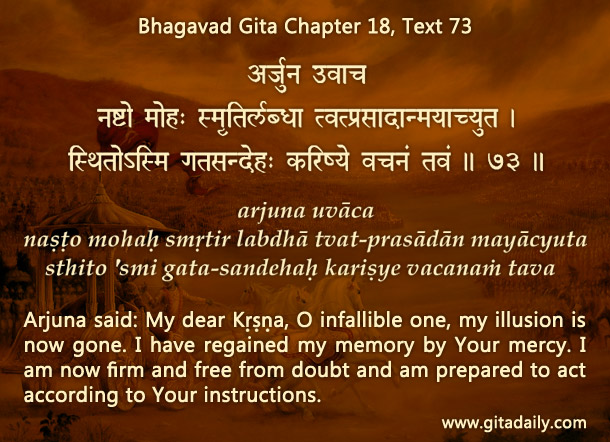
One traditional way to know the import of a complex text is the path-purpose hermeneutic or the sadhana–sadhya approach. Sadhana refers broadly to the means or the path, and sadhya refers to the ends or the purpose. Thus, to know the essence of a complex text, we can focus on what it says about sadhana and sadhya.
This approach is especially relevant for the Gita because it was spoken to a specific person, Arjuna, who wanted to know the right thing to do (02.07). What Arjuna spoke and did on hearing the Gita can reveal his understanding of the Gita’s sadhana and sadhya. Though the Gita talks about multiple sadhanas and sadhyas, what Arjuna speaks and does with Krishna’s approval can be said to be Krishna’s highest recommendation and the Gita’s essence.
To know Arjuna’s understanding of sadhya, let’s look at his declarative statements in the Gita. These occur primarily in the middle of the Gita, in its tenth chapter (10.12-15). In each of these verses, Arjuna unequivocally asserts Krishna’s supreme position, beginning with eight divine signifiers (10.12) and ending with four (10.15).
To know Arjuna’s understanding of sadhana, let’s look at his concluding statement: a solitary verse that ends with a resolve: I will do your will (18.73: karishye vachanam tava). Does Arjuna’s resolve convey simply a generic obedience to an authority? No, because first, the verse itself refers to Krishna with a divine epithet: Achyuta; and second the verse is preceded by emphatic calls for the practice of bhakti (18.65-66). Thus, Arjuna’s resolve signifies his harmonization with the divine will, which is the essence of bhakti.
Can we be sure that Krishna approved Arjuna’s understanding? Yes, because Krishna didn’t correct Arjuna in any way. Far from correcting, Krishna stayed vigilantly with Arjuna after the Gita ended and assisted him repeatedly during the Kurukshetra war.
One-sentence summary:
Arjuna’s words in the Gita reveal Krishna to be the sadhya and bhakti to be the sadhana.
Think it over:
- What is the sadhana-sadhya approach for understanding a spiritual text? Why is it especially relevant for the Gita?
- How do Arjuna’s words reveal the Gita’s sadhana?
- How do Arjuna’s words reveal the Gita’s sadhya?
***
18.73: Arjuna said: My dear Krishna, O infallible one, my illusion is now gone. I have regained my memory by Your mercy. I am now firm and free from doubt and am prepared to act according to Your instructions.
To know more about this verse, please click on the image



This I see in a new light –
– Krishna consciousness is acting according to Krishna’s order. A conditioned soul, illusioned by the external energy of matter, does not know that the Supreme Lord is the master who is full of knowledge and who is the proprietor of everything. Whatever He desires He can bestow upon His devotees; He is the friend of everyone, and He is especially inclined to His devotee. He is the controller of this material nature and of all living entities. He is also the controller of inexhaustible time, and He is full of all opulences and all potencies. The Supreme Personality of Godhead can even give Himself to the devotee. One who does not know Him is under the spell of illusion; he does not become a devotee, but a servitor of maya. Arjuna, however, after hearing Bhagavad-gita from the Supreme Personality of Godhead, became free from all illusion. He could understand that Krishna was not only his friend but the Supreme Personality of Godhead. And he understood Krishna factually. So to study Bhagavad-gita is to understand Krishna factually. When a person is in full knowledge, he naturally surrenders to Krishna. When Arjuna understood that it was Krishna’s plan to reduce the unnecessary increase of population, he agreed to fight according to Krishna’s desire. He again took up his weapons – his arrows and bow – to fight under the order of the Supreme Personality of Godhead.
Ys,